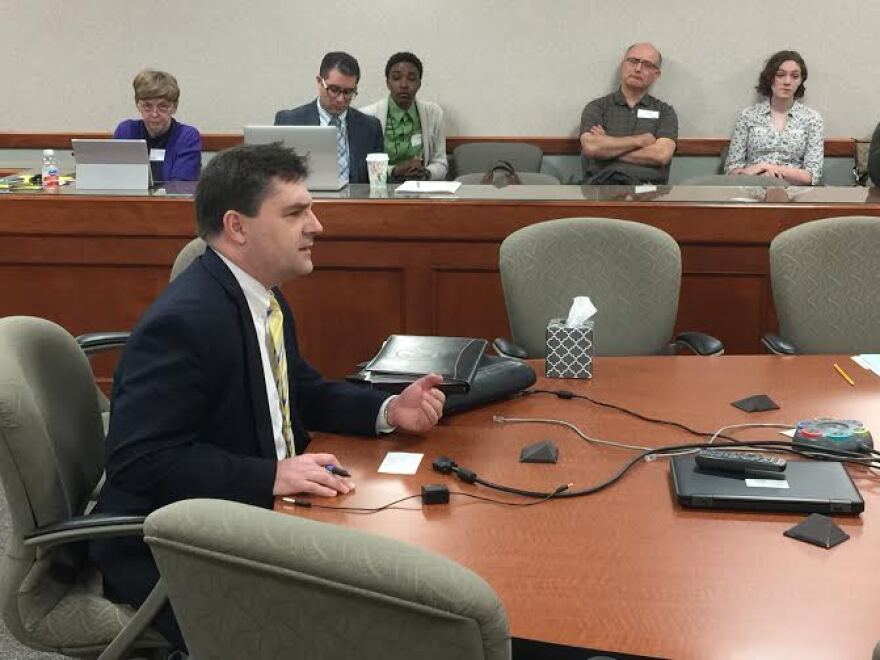It was a tense, emotional afternoon at the Michigan Board of Education.
In the two months since the board put out a draft proposal for how schools could choose to support LGBT kids, it’s become a major controversy.
That’s mostly because the suggestions include letting transgender students use the bathrooms that fit their gender identity – not just the single-stall staff bathrooms.
And some parents feel like the board is trying to cut them out of the conversation, because of wording that’s intended to protect the privacy and safety of students whose parents might not support their gender identity:
Transgender and GNC students have the right to decide when, with whom, and to what extent to share private information. When contacting the parent/guardian of a transgender or GNC student, school staff should use the student’s legal name and the pronoun corresponding to the student’s assigned sex at birth, unless the student or parent/guardian has specified otherwise.
Students share personal experiences with depression, suicidal thoughts
More than a dozen LGBT students turned out to Tuesday’s meeting, where they spoke about the need for policies like the ones the board is suggesting.

“My name is Aiden Ramirez-Tatum. I’m an 18-year-old high school senior at Greenville High School. I’m a trumpet player, a club leader, and an AP student. Four years ago, I wanted to die,” he said, adding that he was bullied relentlessly in middle school at a different school district.
“I was 14 and had just finished a year of school online, an option I chose after facing three years of consistent bullying at my middle school, because I was openly bisexual and gender non-conforming. At the time, I believed what many people still do: that this kind of anguish was simply a symptom of my identity. I was transgender, and I would always suffer.”
Ramirez-Tatum says he transferred to a charter school sophomore year, where an assistant principal told him it was “interesting and fascinating that I was transgender, because she was a scientist.”
After transferring yet again, Ramirez-Tatum says he found a school that accepted him.
“They enacted many of the practices outlined in the guidance the school board has presented, and I had a future again. I realized my pain was not me, it was a side effect of hatred, not who I was.”
His father, James Tatum, also spoke to the board during the public comment section of the meeting.

“I have seen what ignorance and discrimination did to my son. When Aiden first came out to my wife and I, and then the community, the school district we lived in had no guidelines for transgender youth. And bullying by students, and the administration, caused Aiden to live in fear. He withdrew from this abusive situation,” he said.
Tatum says after they transferred Aiden to Greenville, “I’ve seen my son go from a withdrawn, bullied teen, to the top of his class,” his voice catching and tears welling up in his eyes.
“When a child feels safe, they remove mental blocks they put up to protect themselves, and learning becomes easier. I don’t have an education degree, but I stand up here as a father, a father of a very proud son, asking that you not bow to the backlash, and do what is right for these children.”
Republican lawmakers, some parents say the proposals are dangerous
State Senator Patrick Colbeck told the board he believes their intentions are good, but the proposals they’ve suggested are misguided.
“Unfortunately, the policies that are being promoted actually…promote behaviors that are not supportive of safety, not supportive of good health; not only for the students that choose that, but also for all the other students that are in that environment," Colbeck said.

“You know, it’s not bullying or peer pressure that leads to a higher incidence of AIDS in the LGBT community than the normal population,” Colbeck said.
“During elementary and middle school, I was bullied incessantly. I haven’t seen the State Board of Ed propose a policy for kids that get good grades and carry a trombone, right?”
But Jane Lach of Howell told the board that growing up as a transgender student in the 60s, the bullying she experienced was likely on a different level than Colbeck’s.
“I can assure you, that when he carries his trombone home from school, nobody lied in wait for him, to see if they could catch him and beat him senseless for playing the trombone,” she said.
Several commentors spoke to the board about their concerns as parents, that the privacy section of the proposals would shut them out of the conversation.
And one mom said she worries about her daughters’ safety if the proposals are enacted.

“Creating an open door policy to restrooms at elementary, middle school and high school age is going to create problems that I know we all have in our heads,” Jennifer Schlosser of Mason told the board.
“I don’t want to discourage anyone from creating good policy, and I think that this policy is on the right track. My question is, can we revise the bathroom policy, and create something that everyone can handle?
The public comment period will run through May 11th. Already, more than 8,000 comments have been submitted to the board online. Still, the board says they currently have no plans to vote on the proposals anytime soon.









